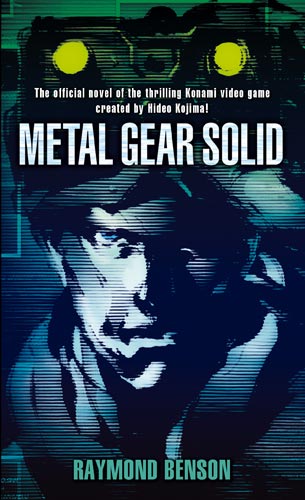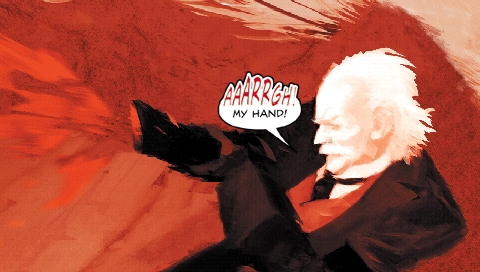Metal Gear Solid Novel, Narrative and Translation
November 15th, 2008
Last Saturday, I accompanied my friend to a street just off the People’s Square, in search for a book store that had particular classic english novel that she was after. Actually this street is popular for its book stores, with about four or five multi-storied stores on the one road. We ducked into a foreign book store and took a squiz, and you wouldn’t believe what I found;

That’s right a novelization of Metal Gear Solid. This was released back in May this year, quite a good find I’d say. So as you can imagine I decided to snap this one up with great haste and a big smile on my face. My decision to pick this up was prompted by a few ideas that have been bouncing around my head relating to video game narrative.
Loose Ideas
Video game narrative more often than not leans to strengths not completely associated – but indeed familiar – with the medium itself. ie. narrative embedded outside of gameplay. The reason for this is obvious, it is a lack long time video game narrative experience met with a marvel of complexities. Forming am effective narrative out of a complex experience such as playing a video game, must be a frightening task. That is, if you do so without using techniques like cut scenes and so forth.
Furthermore a good video game narrative also needs to fit within the context of a video game. Firstly there has to be enough substance to constitute gameplay. Secondly, what occurs in the game should justify and create the narrative itself, you have to participate in it, as such. Spending hours killing monsters has to be useful for something beyond keeping you busy, right? Then the narrative should work within a balance of levels, characters (both playable and non) and other game based variables.
While I think that there is without a doubt some incredible video game narrative in existence – the best of which conforms to the previously explained rules – no doubt, much of it is sort of hybrid. What I mean is that, some narrative you get to play, some narrative unfolds as you play and other narrative is statically presented to you. This is by no means bad or good, since even a game with completely separate narrative and gameplay can still have good narrative. What it means though is that, largely, narratives made in games, with some significant association to play are more or less exclusive only to this medium.
Translation
I’ve been thinking a little about translation recently. The reason being is that my most troublesome problem my Chinese language development, is English. For my Chinese to improve to a higher degree, I need to start thinking in Chinese instead of in English. In a sense I need to step out of myself and focus just on meaning and what I want to say, with the exclusion of language. The reason is that each medium has its own though processes involved with it, this is why as English speakers we are use to precision while Chinese speakers are not so specific with what they say. Video games are the same.

Metal Gear Solid has seen a lot of translation and been has already translated into a radio drama, comic, digital comic and novel. I wonder then how interpretation has changed across each of these and how derivative they are of the video game. The other interesting part of the translation is adaption. That is how the ‘game playing’ elements are adapted to mediums in which involve no participation. Something has to be done by the translator to silence the nuances between the mediums. So I am curious to see how the playable parts of MGS were handled.
Of course, I want to use these ideas for when I read the book and later document my thoughts (and probably when I get home and look into the digital novel too). Already the first chapter begins with a sequence long before the events on Shadow Mosses island, not shown in the video games.



 Game Design Companion: A Critical Analysis of Wario Land 4 - $7.99
Game Design Companion: A Critical Analysis of Wario Land 4 - $7.99 Level Design: Processes and Experiences
Level Design: Processes and Experiences Speed Boost: The Hidden Secrets Behind Arcade Racing Design - $5.99
Speed Boost: The Hidden Secrets Behind Arcade Racing Design - $5.99 Adventures in Games Analysis: Volume I - $5.99
Adventures in Games Analysis: Volume I - $5.99







